Kenya
As a familiar campaign jingle brings the Kenyan crowd to their feet, Hellen Atieno joins her compatriots and sways to the catchy tune at a political rally in the lakeside city of Kisumu.
Just don't expect the 23-year-old to vote. "I have only come to the rally because there is money. I hope there will be something," Atieno told AFP, referring to the widespread Kenyan practice of offering freebies to prospective voters.
Currently without a job, the former fishmonger says she is so fed up with the country's insular political class that she plans to stay home when Kenya votes on August 9 in parliamentary and presidential polls.
She is not alone. The East African economic powerhouse ranks among the world's youngest countries -- three-quarters of Kenyans are aged under 34, according to government figures.
Many have no interest in participating in an electoral process they widely dismiss as corrupt and pointless.
The number of registered young voters has dropped five percent since the 2017 poll, in contrast to over-35s, whose tally has increased, Kenya's election commission announced last month.
Over 22 million Kenyans are eligible to take part in this year's polls, with young people accounting for less than 40 percent of that number, the Independent Electoral and Boundaries Commission (IEBC) said.
'A dirty game'
Politicians have responded with a freebie bonanza, offering cash, umbrellas, shirts, caps and even packets of maize flour -- a dietary staple -- to anyone who attends their rallies.
The bribes -- an electoral offence that can attract a fine of up to two million Kenyan shillings ($17,000) and/or a six-year jail term -- are not new to Kenyan politics. But galloping food inflation -- made worse by the war in Ukraine -- and an unemployment crisis have intensified the appetite for such handouts.
According to census figures published in 2020, about five million young Kenyans were out of work.
Brian Denzel has spent recent weeks hitting one rally after another, eager to pocket the cash on offer, even though the 19-year-old butcher has no plans to vote and sees politics as little more than "a dirty game".
"Who will reject the free money that they are given?" he said, while waiting in line to collect 200 shillings ($1.70) from a local politician.
Kenya's Interior Minister Fred Matiang'i even told reporters on Wednesday that the banks were running short of 100 and 200 shilling notes "because politicians are bribing villagers".
In the months leading up to the polls, observers suggested that the youth factor could help heal Kenya's often toxic tribal politics, with a younger electorate less likely to vote according to ethnic affiliations.
Yet, although young Kenyans are less tribally-minded, they also lack "ideological steadfastness", Kisumu-based political analyst Francis Owuor told AFP.
"That conviction that normally comes with the political process is not there," Owuor said. "Everyone (is) to blame for this, both the people and the leaders, but again the leaders are the duty bearers, so they must take much of the blame."
Disillusioned
Thirty years after the emergence of multi-party democracy in Kenya, many are disillusioned by constant battles over the credibility of polls and disputed election results.
This year's presidential vote is largely a two-horse race between Deputy President William Ruto, 55, and Raila Odinga, the 77-year-old veteran opposition leader who is now backed by the ruling party.
If both leaders accept the results, it will be a first for the country since 2002.
Amina Soud, manager for voter education at the IEBC, told AFP the election watchdog was "worried" by the increasing indifference shown by young people towards the political process.
"We did a lot of mobilization during registration using all these tools and still voter apathy was too high," Soud said, referring to the IEBC's social media push to enlist new voters.
But exhorting youth to vote via campaigns on TikTok or comics in Sheng -- a local slang popular with urban youth -- does little to offer hope to a generation of Kenyans facing runaway inflation, corruption and unemployment.
"I don't think I am going to vote," 27-year-old salon owner Irene Awino Owino told AFP. "I have no interest, because the government puts themselves first rather than us."




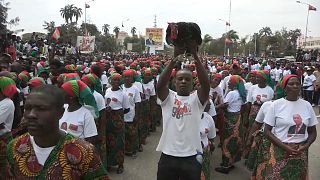
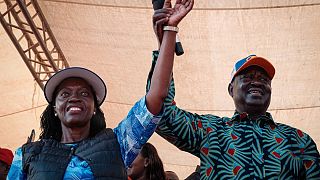
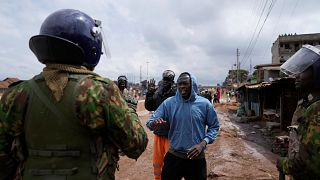
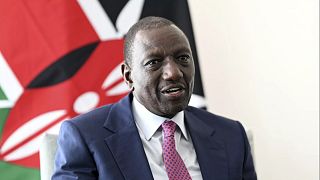
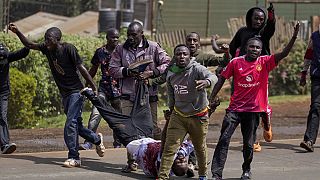


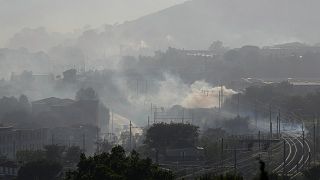
Go to video
First Malaria treatment for babies approved
00:37
UN Human Rights Office says 'deeply troubled' by Kenya protester deaths
01:45
Empowering youth in agriculture could boost global economy, FAO report says
00:28
Nairobi hawker shot at close range by police declared brain dead
01:50
Faith Kipyegon falls short of historic sub-four minute mile but vows to keep pushing
Go to video
Kenya's Interior minister accuses protesters of coup attempt after deadly demos